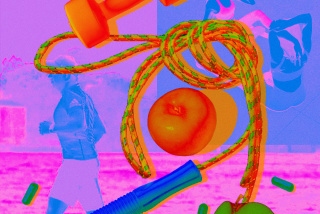Obesity: Was HBO’s ‘Weight of the Nation’ too lightweight?
HBO’s four-part documentary, “The Weight of the Nation,” was the subject of much commentary this week, with critics of all stripes complaining that the program didn’t focus on the right issues.
“Why doesn’t HBO’s new series, ‘The Weight of the Nation,’ even mention addiction?” asked the Fix’s Susan Cheever. “We keep getting fatter and fatter because we are overlooking, if not ignoring, an important cause of obesity -- addiction. Certain foods, like certain drinks, trigger an addictive reaction in many people. Once eaten, these foods create a craving for more, more, more. ‘Bet you can’t eat just one,’ the old Lays Potato Chips ad, is as good a definition of alcoholism (or any addiction) as I know.”
Don’t I know it. This is precisely why I buy single-size portions of snacks in real time. Leave me alone with a box of cookies and there’s a very good chance I’ll polish them all off. Willpower, after all, “is not an exhaustible resource,” and after a day of avoiding the office junk food, my defenses are worn down by the time I get home.
Pointing to former FDA commissioner Dr. David Kessler’s 2009 book “The End of Overeating,” Cheever continues: “He accuses the food industry and restaurant chains of engineering foods to be increasingly addictive (just as the tobacco industry does with cigarettes); they scientifically experiment with taste, texture, color, smell, look -- and above all the empty calories of sugar, fat and salt -- to come as close as possible to eating’s ‘bliss point,’ in Kessler’s words, where the brain’s reward system is captured by this immensely complex, artificially designed food that is as powerful as a drug.”
For Ed Stockly, the problem with the series is that it lacked balance and focused too much on calorie intake rather than insulin. “Whenever insulin levels in the blood rise, the body stores fat. In most people insulin rises after a meal, and rises higher after meals with a high carbohydrate content, especially simple carbs like sugar, pasta or white flour,” he wrote in a TV Skeptic post on Show Tracker.
Others griped that the program didn’t present solutions in the form of policy changes. “I wanted to see the programs take leadership on how government can help citizens reduce the social, economic, and business drivers of obesity,” wrote Food Politics’ Marion Nestle. Michele Simon agreed, writing on Grist, “[N]ot a single lawyer appeared to discuss litigation as a strategy to hold the food industry accountable. And what about the farm bill, which is up for renewal this year? Nope, that’s all too edgy -- even for HBO.”
Our own David Lazarus weighed in too: “At the risk of being criticized (and I know I will be) for advocating draconian measures, I think it’s time that food and drink received the same level of regulatory oversight as tobacco and alcohol.”
I couldn’t agree more.
ALSO:
It’s not just what you eat, but when you eat it
Sugar may make you stupid -- talk about adding insult to injury
Follow Alexandra Le Tellier on Twitter @alexletellier. Follow Opinion L.A. on Twitter and Facebook.
More to Read
A cure for the common opinion
Get thought-provoking perspectives with our weekly newsletter.
You may occasionally receive promotional content from the Los Angeles Times.






